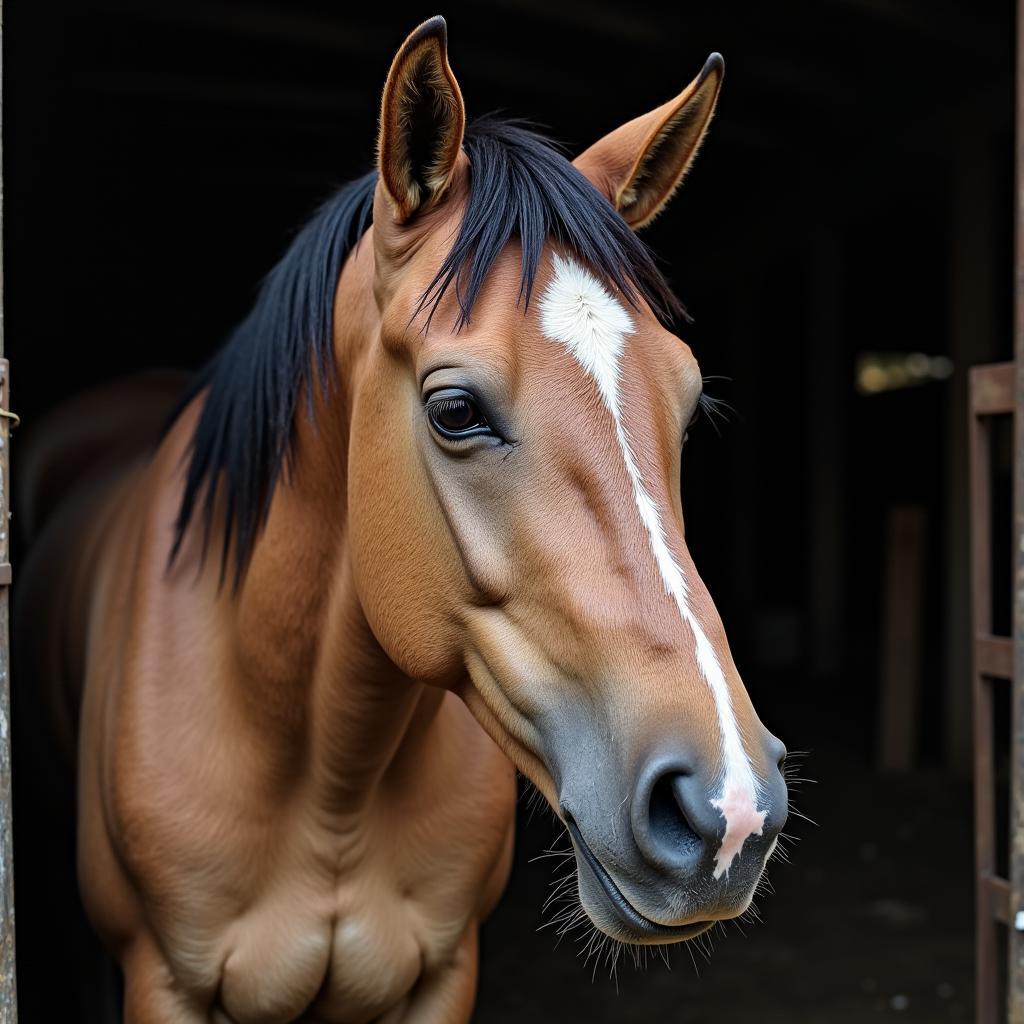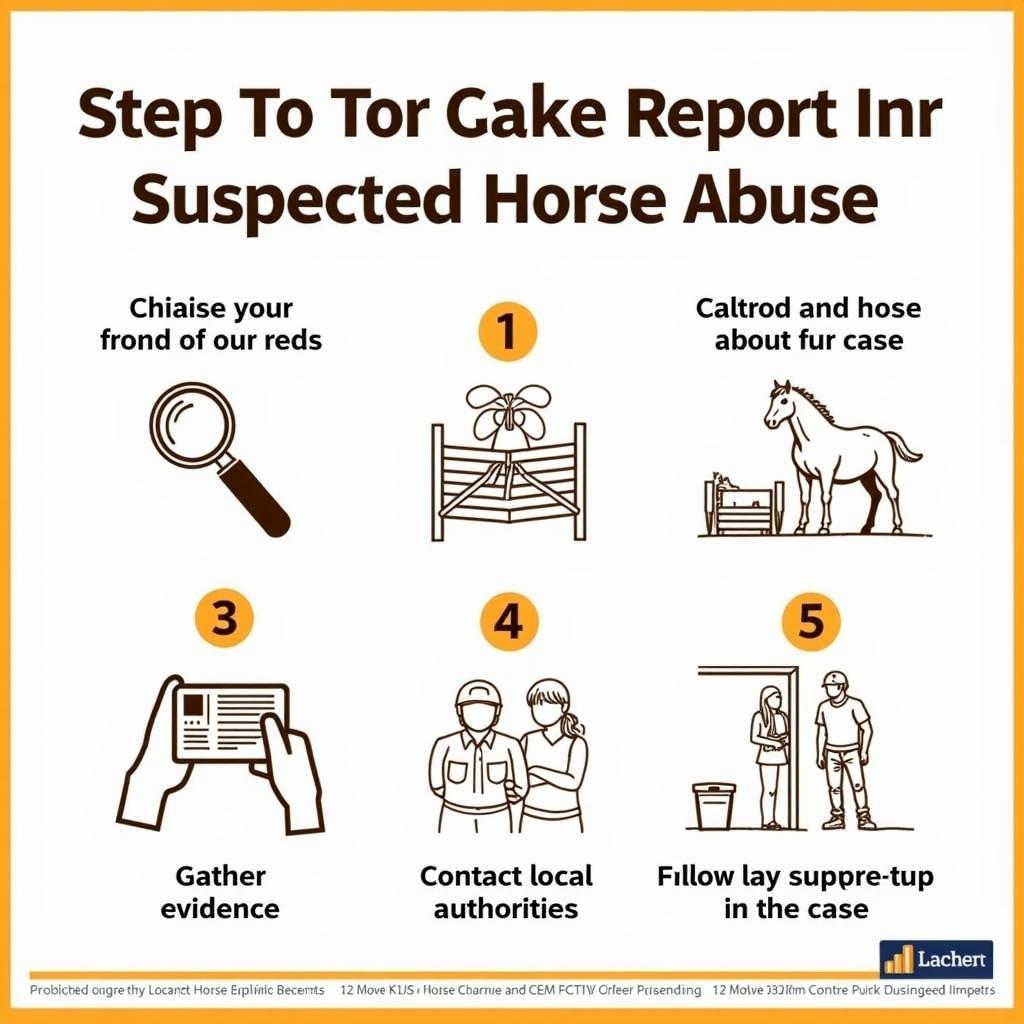In the world of equestrianism, the well-being of horses is paramount. Sadly, Abused Horses are a heartbreaking reality that demands attention and action. Understanding the signs of abuse and learning how to help these vulnerable animals is crucial for anyone who cares about their welfare.
The Silent Suffering: Identifying Abused Horses
 Recognizable Signs of Horse Abuse
Recognizable Signs of Horse Abuse
Recognizing the signs of an abused horse is the first step towards intervention. While some indicators may be subtle, others are glaringly obvious.
- Physical Condition: Malnourished horses often exhibit protruding ribs, a dull coat, and a general lack of energy. Open wounds, untreated injuries, and overgrown hooves are clear signs of neglect.
- Behavioral Cues: Abused horses may flinch at human touch, display signs of anxiety or fear, and exhibit aggressive behavior. They might also show reluctance to be ridden or handled.
- Environmental Factors: A horse’s living conditions can also point towards abuse. A filthy stall, lack of clean water, and inadequate shelter are red flags that should never be ignored.
The Different Faces of Equine Abuse
Abuse takes many forms, and it’s essential to recognize the various ways in which a horse can be mistreated.
- Physical Abuse: This encompasses any intentional act of violence, such as hitting, kicking, or whipping a horse.
- Neglect: Failing to provide a horse with basic necessities like food, water, shelter, and veterinary care is a form of passive abuse that can be equally detrimental.
- Emotional Abuse: Constant yelling, intimidation, and harsh training techniques can inflict long-lasting psychological trauma on horses.
“Horses are incredibly sensitive creatures,” states Dr. Emily Carter, DVM, an equine veterinarian with over 20 years of experience. “The effects of abuse, both physical and emotional, can have profound and lasting impacts on their well-being.”
Taking Action: What to Do If You Suspect Abuse
 How to Report Horse Abuse
How to Report Horse Abuse
Suspecting abuse is not enough; taking action is crucial. If you encounter a situation where you believe a horse is being abused:
- Document the Evidence: If possible, take photos or videos of the horse and its living conditions. Note the date, time, and specific details of your observations.
- Contact Authorities: Report your concerns to your local animal control, humane society, or law enforcement agency.
- Follow Up: After filing a report, follow up with the authorities to ensure that the case is being investigated.
Finding Hope: Rescue and Rehabilitation
Thankfully, there are organizations dedicated to rescuing and rehabilitating abused horses.
- Horse rescue organizations: These groups provide sanctuary, veterinary care, and rehabilitation services to horses who have suffered from abuse and neglect. They often rely on donations and volunteers to continue their essential work.
- Equine therapy programs: Some organizations utilize rescued horses in therapy programs designed to help people with physical, emotional, and cognitive challenges. This type of program provides a healing environment for both the horses and the individuals they assist.
If you’re interested in supporting these efforts, consider donating to or volunteering at Horses Unlimited Rescue and Education Center Inc.
Preventing Abuse: A Collective Responsibility
Preventing horse abuse is a collective responsibility that requires education, awareness, and empathy.
- Educate Yourself: Learn about proper horse care, training methods, and responsible ownership. Knowledge is power when it comes to recognizing and preventing abuse.
- Speak Up: If you witness any form of abuse or neglect, don’t stay silent. Reporting these incidents is crucial for protecting vulnerable horses.
- Support Ethical Practices: Choose to support businesses, trainers, and organizations that prioritize horse welfare and advocate for ethical treatment.
“By working together,” emphasizes Dr. Carter, “we can create a world where horses are treated with the respect, care, and compassion they deserve.”
FAQs about Abused Horses
1. Can an abused horse ever fully recover?
With proper care, rehabilitation, and a loving environment, abused horses can make remarkable recoveries. However, some horses may bear the emotional and physical scars of abuse for life.
2. What are the legal consequences of horse abuse?
Laws regarding animal cruelty vary by state and jurisdiction, but abusers can face fines, jail time, and a ban on owning animals in the future.
Need Help? We’re Here for You
If you suspect a horse is being abused or if you need assistance with a horse-related issue, please don’t hesitate to contact us. You can reach us at Phone Number: 0772127271, Email: [email protected] Or visit our address: QGM2+WX2, Vị Trung, Vị Thuỷ, Hậu Giang, Việt Nam. Our dedicated customer support team is available 24/7 to assist you.